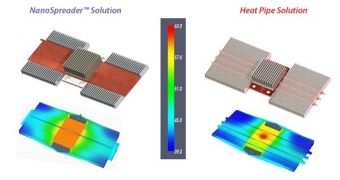We all know that high-performance graphics cards tend to get seriously hot when used at their full potential, which is why various cooling product makers are continuously working on the development of better and more efficient ways to cool down the card's GPU. One of those solutions comes from a company called Celsia Technologies, which has been invited at the 2008 AMD Technical Forum and Exposition to demonstrate the cooling factor achieved by its NanoSpreader solution.
“Working with AMD, we were able to meet all of the design criteria for a new GPU cooler. Namely, it had to be lighter, perform better and be lower cost than the current heat pipe based design,” said Joe Formichelli, Celsia's CEO. “Unlike thermal modules using heat pipes, our two-phase NanoSpreader comes in direct contact with the heat source whereby removing costly, heavy base plates.”
Speaking of which, when not demonstrating the cooling capabilities of its patented NanoSpreader solution, Celsia Technologies is also working on the development of a more efficient cooling solution that will be specifically designed to ease temperatures for some of AMD's recently-released high-performance graphics cards. The cooperation between the two can ultimately improve performance for the high-end Radeon graphics cards, enabling computer enthusiasts to push the limits of their high-end graphics solutions.
According to Celsia, graphics cards can be more efficiently cooled down using a 2mm thick NanoSpreader that is incorporated on the card, using a copper mounting block and aluminum fins. This solution is set to deliver a performance gain of 14% over standard heat pipes, a number that clearly favors the possibility of upcoming Radeon graphics cards cooled down by Celsia's own solution.
As mentioned above, there are numerous cooling solutions out there designed by various manufacturers, specifically created to help users deal with the high heat levels delivered by high-end hardware products, such as CPUs, GPUs, memory, chipsets, etc. Now, whether Celsia's solution will prove to be better than competitive products is still to be seen.

 14 DAY TRIAL //
14 DAY TRIAL //